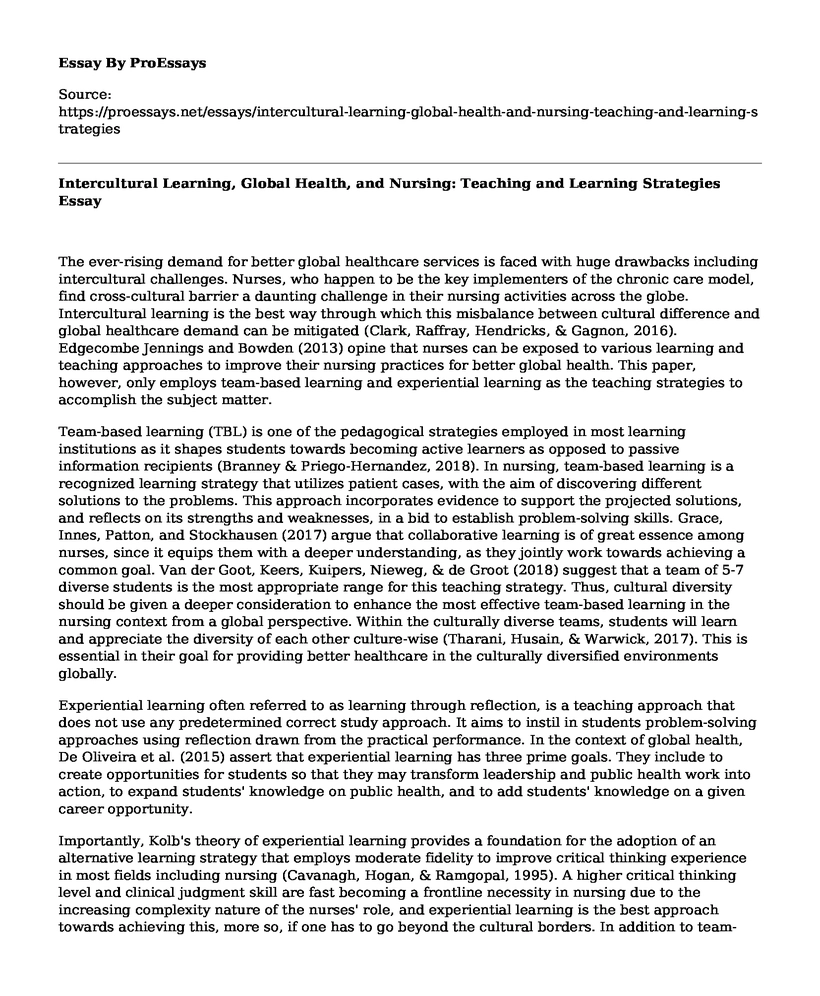The ever-rising demand for better global healthcare services is faced with huge drawbacks including intercultural challenges. Nurses, who happen to be the key implementers of the chronic care model, find cross-cultural barrier a daunting challenge in their nursing activities across the globe. Intercultural learning is the best way through which this misbalance between cultural difference and global healthcare demand can be mitigated (Clark, Raffray, Hendricks, & Gagnon, 2016). Edgecombe Jennings and Bowden (2013) opine that nurses can be exposed to various learning and teaching approaches to improve their nursing practices for better global health. This paper, however, only employs team-based learning and experiential learning as the teaching strategies to accomplish the subject matter.
Team-based learning (TBL) is one of the pedagogical strategies employed in most learning institutions as it shapes students towards becoming active learners as opposed to passive information recipients (Branney & Priego-Hernandez, 2018). In nursing, team-based learning is a recognized learning strategy that utilizes patient cases, with the aim of discovering different solutions to the problems. This approach incorporates evidence to support the projected solutions, and reflects on its strengths and weaknesses, in a bid to establish problem-solving skills. Grace, Innes, Patton, and Stockhausen (2017) argue that collaborative learning is of great essence among nurses, since it equips them with a deeper understanding, as they jointly work towards achieving a common goal. Van der Goot, Keers, Kuipers, Nieweg, & de Groot (2018) suggest that a team of 5-7 diverse students is the most appropriate range for this teaching strategy. Thus, cultural diversity should be given a deeper consideration to enhance the most effective team-based learning in the nursing context from a global perspective. Within the culturally diverse teams, students will learn and appreciate the diversity of each other culture-wise (Tharani, Husain, & Warwick, 2017). This is essential in their goal for providing better healthcare in the culturally diversified environments globally.
Experiential learning often referred to as learning through reflection, is a teaching approach that does not use any predetermined correct study approach. It aims to instil in students problem-solving approaches using reflection drawn from the practical performance. In the context of global health, De Oliveira et al. (2015) assert that experiential learning has three prime goals. They include to create opportunities for students so that they may transform leadership and public health work into action, to expand students' knowledge on public health, and to add students' knowledge on a given career opportunity.
Importantly, Kolb's theory of experiential learning provides a foundation for the adoption of an alternative learning strategy that employs moderate fidelity to improve critical thinking experience in most fields including nursing (Cavanagh, Hogan, & Ramgopal, 1995). A higher critical thinking level and clinical judgment skill are fast becoming a frontline necessity in nursing due to the increasing complexity nature of the nurses' role, and experiential learning is the best approach towards achieving this, more so, if one has to go beyond the cultural borders. In addition to team-based learning, experiential learning approach is of great vitality in intercultural learning steered towards nursing practice at a global frame (Fowler, 2008). Intercultural learning through experiential learning strategy has not only helped nurses diligently perform their daily professional duties; it has reshaped the global health image (Vanhanen & Janhonen, 2000). Consequently, nurses have been able to accommodate intercultural differences, thus reducing the complexity of nursing role, which comes with culture interaction.
References
Branney, J., & Priego-Hernandez, J. (2018). A mixed methods evaluation of team-based learning for applied pathophysiology in undergraduate nursing education. Nurse Education Today, 61, 127-133.
Clark, M., Raffray, M., Hendricks, K., & Gagnon, A. J. (2016). Global and public health core competencies for nursing education: A systematic review of essential competencies. Nurse Education Today, 40, 173-180.
Cavanagh, S., Hogan, K., & Ramgopal, T. (1995). The assessment of student nurse learning styles using the Kolb Learning Styles Inventory. Nurse Education Today, 15(3), 177-183.
De Oliveira, S. N., do Prado, M. L., Kempfer, S. S., Martini, J. G., Caravaca-Morera, J. A., & Bernardi, M. C. (2015). Experiential learning in nursing consultation education via clinical simulation with actors: Action research. Nurse Education Today, 35(2), e50-e54.
Edgecombe, K., Jennings, M., & Bowden, M. (2013). International nursing students and what impacts their clinical learning: A literature review. Nurse Education Today, 33(2), 138-142.
Grace, S., Innes, E., Patton, N., & Stockhausen, L. (2017). Ethical experiential learning in medical, nursing and allied health education: A narrative review. Nurse Education Today, 51, 23-33.
Tharani, A., Husain, Y., & Warwick, I. (2017). Learning environment and emotional well-being: A qualitative study of undergraduate nursing students. Nurse Education Today, 59, 82-87.
Van der Goot, W. E., Keers, J. C., Kuipers, R., Nieweg, R. M., & de Groot, M. (2018). The effect of a multifaceted evidence-based practice programme for nurses on knowledge, skills, attitudes, and perceived barriers: A cohort study. Nurse Education Today.
Vanhanen, L., & Janhonen, S. (2000). Changes in students' orientations to nursing during nursing education. Nurse Education Today, 20(8), 654-661.
Fowler, J. (2008). Experiential learning and its facilitation. Nurse Education Today, 28(4), 427-433.
Cite this page
Intercultural Learning, Global Health, and Nursing: Teaching and Learning Strategies. (2022, Apr 04). Retrieved from https://proessays.net/essays/intercultural-learning-global-health-and-nursing-teaching-and-learning-strategies
If you are the original author of this essay and no longer wish to have it published on the ProEssays website, please click below to request its removal:
- Creative Writing Stories on Personal Experience
- Essay on Campus Life
- Why Being Bilingual Makes the Brain Stronger Essay
- Paper Example on Blunt Force Injuries
- Findings of 2 Research Articles on Sociolinguistic Theory Paper Example
- MMR Vaccination Rates Drop After 1998 Lancet Article - Essay Sample
- Virtual Versus Real Classrooms - Essay Sample







